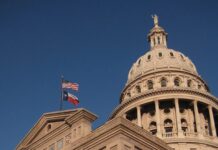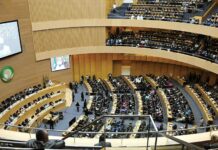Thousands of Kenyans (especially young Kenyans) have been gathering in the streets protesting against new tax proposals that have been put forward by President William Ruto’s administration, as part of its annual budget legislation. Protesters have clashed with police in Kenya’s capital Nairobi and in various cities across the country. The hashtag: #RejectFinanceBill2024, has been trending as Kenyans have taken to social media, to express their frustrations and gin up support for their protest.
According to the Associated Press, the new taxes would include a 2.75% levy on income for the national medical insurance plan. Other changes include increased taxes on vegetable oil and fuel. There had been proposals to introduce a 16% value-added tax on bread and an annual tax on motor vehicles, however the Kenyan government had eventually backtracked on those specific proposals, per the AP.
The Kenyan government is implementing this tax plan following advice it had received from the International Monetary Fund, which has urged the Kenyan government to increase revenues in its 2024/25 budget to reduce state borrowing, according to Reuters. This has come not long after Kenya reached a staff level agreement with the IMF paving the way for the disbursement of about $976 million, per CNBC Africa.
This tax plan has been met with absolute fury by younger Kenyans, especially. Chants of “Ruto must go” and “We say no to economic dictatorship” have been heard at various protests around the country, according to Reuters. Although most reports have shown the protests to be mostly peaceful, the Kenya police have been accused of using a very heavy-handed approach to disperse protesters. Around one protester has reportedly been killed and over 200 injured, according to Reuters.
This move by the Ruto administration follows the pattern of another tax plan that had been passed last year by his government. Then, the tax plan had been met with nationwide protests that had were called for by Raila Odinga, the head of the opposition party. That tax plan then included a 1.5 percent housing levy, a 16 percent tax on petroleum products and a 16 percent value-added tax (VAT) had been placed on money that policyholders receive as compensation from insurance companies, according to Al Jazeera.
Similarly in October last year, Ruto’s government passed a bill aimed at taxing the revenue digital content creators. That bill had similarly received a lot of backlash from younger Kenyans, as they are more likely to earn money from publishing content online. The bill introduced a 15% tax on the earnings of digital content creators in Kenya, according to Deutsche Welle.
These bills follow a pattern by the Ruto administration. Ruto’s government has been looking for different ways in which he can reduce Kenya’s government costs, thereby reducing borrowing. Along those lines, Ruto’s government had even sought to remove government subsidies put in place by his predecessor’s administration on fuel. However, Ruto’s administration reinstated a small subsidy to stabilise retail fuel prices after public anger over the high cost of living, according to Al Jazeera.
These protests follow a trend across the continent as Africans have become angered due to the rising costs of living in our countries. Similarly, in Nigeria, we have seen numerous protests against our government over their economic policies. The removal of our fuel subsidy and rapid loss of value of the Naira has made life considerably difficult in Nigeria. We recently even saw a major labour union strike by the National Labour Council, which saw the electricity grid shut down by striking workers.
For many African countries, increasing inflation and borrowing costs have put many governments in a difficult position, when it comes to repaying their loans. To make matters even worse, the recent strength of the US Dollar, due to high interest rates by the US Central Bank, have made repaying loans and raising money significantly more expensive for African countries. As a result, we have seen numerous African countries defaulting on their loans in recent years, such as Zambia and Ghana. Likewise, African countries such as Kenya, Morocco, Nigeria, Ghana, and Egypt have received credit downgrades from prominent credit rating agencies, per DownToEarth.org.
That is why we have seen so many African countries attempting to reduce their costs, often with incredibly unpopular austerity measures and tax increases. In Egypt, recently the removal of a subsidy on the price of bread resulted in a quadrupling of the price of bread, per Reuters, causing major discontent among Egyptians.
Africans are especially hostile towards these moves by our governments because of the lack of trust between the public and our governing institutions. Decades of widespread corruption have meant many are especially opposed towards tax hikes proposed by our governments.
It has been too frequently the case that we have seen government funds being used on vanity projects by our politicians. When our governments allocate public funds for extravagant expenditures such as constructing palaces and mansions for politicians, purchasing private jets, and acquiring expensive vehicles, it undermines their credibility when they later claim there is no money for essential services. This discrepancy fosters widespread scepticism among the public.
That is the reason we are seeing such widespread anger among young Kenyans protesting against this tax bill. For younger African generations especially, as we are more likely to suffer from a lack of economic opportunities. These austerity measures and tax hikes put in place by our governments, only serve to make a bad economic reality even worse for many young Africans. That is why Generation Z Kenyans have been the most vocal in criticising this tax plan by the Kenyan government.












